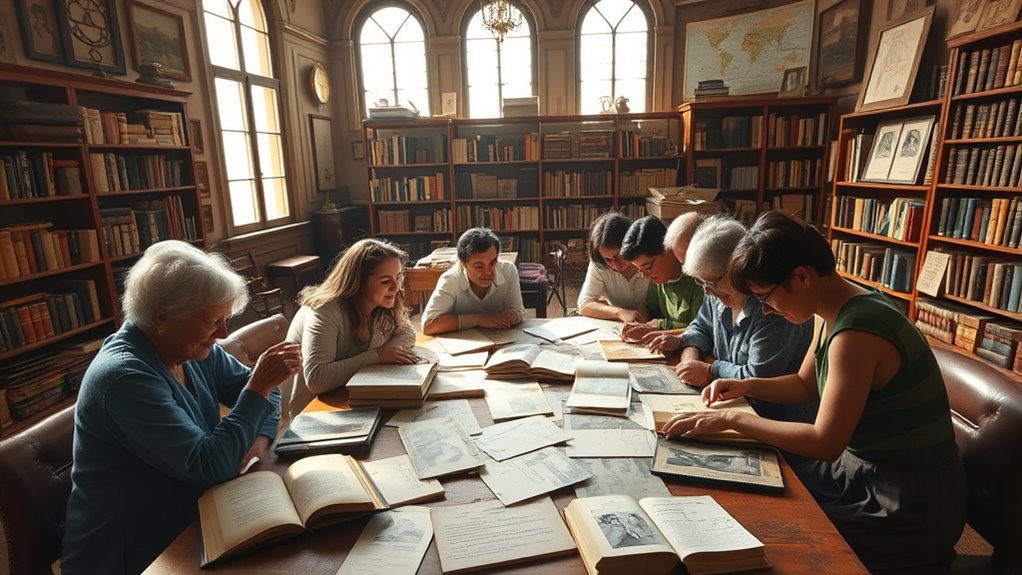Exploring genealogy and family history helps you uncover your roots and connect with your ancestors. By tracing family lines, you can discover fascinating stories that shape your identity. Start by gathering information on known relatives and utilize various resources like online databases and local archives. Through this journey, not only will you strengthen your sense of belonging, but you’ll also gain valuable insights about your heritage. There’s much more to uncover about your family’s past awaiting you.
Key Takeaways
- Genealogy involves tracing family lines through confirmed information, creating detailed family trees that illustrate kinship and ancestry.
- Utilizing interviews with family members can uncover personal stories and deepen connections to your heritage.
- Online resources like Ancestry.com and FamilySearch.org provide access to vital records, simplifying the research process.
- DNA testing can establish connections to relatives, confirming historical findings and enhancing the understanding of family roots.
- Exploring family history fosters a sense of belonging and identity, promoting emotional resilience and psychological well-being through ancestral knowledge.
Understanding Genealogy: A Brief Overview

Genealogy is more than just a hobby; it’s a fascinating journey into your family’s past. It involves tracing your family lines and researching data to uncover relationship patterns. By discovering and confirming crucial information like births and marriages, you can create detailed family trees that demonstrate kinship.
You’ll often start with known relatives and plunge into historical records, utilizing online resources like Ancestry.com and FamilySearch. Organizing your findings with genealogical software helps create timelines, while proper source citation guarantees your research’s credibility. Additionally, genealogy can uncover surprising connections that may link you to historical figures or celebrities.
You’ll prefer primary sources like birth certificates for accuracy, but secondary sources can also fill gaps. Ultimately, understanding genealogy enriches your knowledge of family traditions, migrations, and the historical context of your ancestors’ lives.
Historical Roots of Genealogy

Throughout history, the practice of tracing family lineage has evolved considerably, reflecting societal values and structures. In ancient civilizations, you’d find families relying on oral traditions to pass down their histories, often emphasizing male lineage and noble bloodlines. Rulers claimed descent from gods, intertwining genealogy with divine legitimacy. In addition, many cultures used family health as a means to assess hereditary traits and conditions, influencing marriage and offspring decisions.
The Middle Ages further solidified these practices through the feudal system, where genealogy determined land ownership and status, supported by heraldry and church records. As Europe entered the 1500s, increased literacy and the printing press made genealogical information more accessible, paving the way for modern genealogy. Religious institutions played a crucial role in maintaining vital genealogical records, further shaping social networks and the understanding of ancestry.
Meanwhile, in Asia and Africa, longstanding traditions persisted, with written records dating back centuries, showcasing the cultural significance of family lineage across the globe.
Essential Research Methods for Tracing Ancestry

When you commence on the journey of tracing your ancestry, it’s essential to establish clear research objectives right from the start. Define specific goals, whether you’re tracing a lineage or exploring an ancestor’s story.
Begin with known family members, gathering names, dates, and places. Utilize tools like pedigree charts and research logs to keep your information organized. Create a family tree using digital programs, updating it as you discover new data.
Record interviews with family members to capture stories and insights. Gather information from family members and assess the credibility of your sources while documenting everything accurately.
Stay open-minded during your research, ready to adapt your plan as new information emerges. This structured approach will keep you efficient and focused on your ancestry journey.
Key Resources and Archives for Genealogical Research

A wealth of resources and archives awaits you on your genealogical journey, making it easier to uncover your family’s history.
Begin with the Library of Congress and the National Archives, where you’ll find extensive records and historical materials. The National Archives and Records Administration is a vital national repository of U.S. Federal government records supporting genealogical research.
Online, FamilySearch.org is a fantastic starting point, offering a massive collection of free records.
Don’t overlook Find a Grave and Billion Graves for valuable gravesite data.
Local libraries and historical societies often hold unique regional records, while specialized databases like the U.S. Census Bureau provide essential historical data.
Joining organizations such as the National Genealogical Society can connect you with resources and workshops.
With these key resources, you’ll be well-equipped to explore your ancestry research.
Overcoming Challenges in Genealogy

Genealogical research can be a rewarding yet challenging endeavor, especially when you encounter obstacles like missing records or vague family memories.
To overcome these issues, start by interviewing older family members; their stories can fill in gaps. If records are scarce, consider using DNA testing to gain insights into your ancestry.
Organizing your data with genealogy software and creating structured family trees will help you manage your findings efficiently. Stay persistent when facing dead ends, and be flexible in adapting your strategies as new information arises.
Understanding your ancestors’ community context can also offer valuable clues. Remember, combining various research methods will enhance your chances of breaking through those barriers.
The Role of Technology in Modern Genealogy

As technology continues to evolve, it’s transforming the way you approach genealogical research. The digitization of records makes accessing essential documents easier than ever, eliminating the need for physical visits.
DNA testing connects you to relatives and confirms historical findings. Artificial intelligence (AI) enhances your research by recognizing patterns and automating data analysis, reducing errors and increasing accuracy.
Online platforms like FamilySearch.org and Ancestry.com offer vast databases, while mobile apps let you research on-the-go. With collaborative forums, you can share insights and connect with fellow genealogists.
Embracing these technological innovations not only streamlines your research but also expands your understanding of your family history, opening up new avenues for discovery.
Building Community Through Genealogical Education

While many people plunge into genealogical research independently, building community through education can considerably enhance your experience and knowledge.
Joining genealogical societies opens doors to classes and seminars that sharpen your research skills. Online resources, like webinars, make learning accessible from your home, while workshops provide hands-on training in specific techniques.
Engaging with local libraries can also connect you to valuable historical documents. Participating in events and conferences fosters networking and collaboration, allowing you to connect with others who share your interests.
Special interest groups and social media platforms provide additional avenues for sharing discoveries and encouraging collaboration. Embracing these educational opportunities not only boosts your skills but also strengthens your ties to the genealogical community.
Emotional Connections: The Impact of Discovering Family History

Discovering your family history can profoundly enrich your emotional well-being, creating connections that resonate through generations.
Engaging in genealogical research not only reduces anxiety by about 20%, but it also boosts your self-esteem by roughly 8%. As you uncover your heritage, you’ll feel a stronger sense of belonging and identity, enhancing your emotional resilience.
Family narratives can unify your family, fostering understanding and empathy, especially during challenging times. By knowing your ancestors’ struggles and triumphs, you develop coping mechanisms that help you navigate your own challenges.
This process encourages mindfulness and reflection, ultimately leading to increased psychological well-being and a deeper appreciation for your roots. Embracing your family history can transform how you view yourself and your place in the world.
Frequently Asked Questions
What Are the Best First Steps for Genealogy Beginners?
If you’re starting your genealogy journey, begin by setting clear, achievable goals, like tracing a family line back a few generations.
Review any existing family research to avoid duplication and gather basic information from family members.
Familiarize yourself with both free and paid resources like Ancestry and FamilySearch.
Document your findings in a research log to stay organized.
Finally, connect with relatives for insights and stories that can enrich your understanding of your family’s history.
How Can I Preserve My Family History Documents?
To preserve your family history documents, handle them carefully, store them properly, and digitize them for safety.
Use clean hands and a flat surface when handling, and keep them in a cool, dry place.
Create digital copies for easy sharing, and use acid-free materials for storage.
Record stories behind each document to add context.
What Are Common Myths About Genealogy Research?
When diving into genealogy research, you might encounter several common myths.
Many believe only noble families have interesting histories, but every lineage has unique stories.
Some think DNA tests are definitive answers, but they’re just one piece of the puzzle.
You might assume all records are online, yet many remain in physical archives.
Finally, don’t expect to find famous ancestors; genetic diversity makes that unlikely for most people.
Are There Ethical Considerations in Genealogical Research?
Yes, there’re important ethical considerations in genealogical research. You need to respect individuals’ privacy, especially for living people, and obtain informed consent before sharing any personal information.
Handling sensitive data, like family secrets or DNA results, requires sensitivity and discretion. It’s essential to communicate clearly and use reliable sources, ensuring you maintain professionalism and cultural sensitivity throughout your research.
Regularly reviewing ethical guidelines helps you navigate complex situations effectively.
How Do I Handle Conflicting Information in Family Records?
When you encounter conflicting information in family records, start by documenting each discrepancy clearly.
Analyze the sources to determine their reliability, focusing on original documents over secondary ones.
Create a comparison chart to visualize the differences, and prioritize the most credible sources.
If you can’t resolve all conflicts, accept that some may remain.
Keep thorough notes on your reasoning and maintain consistency in how you document names and dates for future reference.
Conclusion
As you plunge into genealogy, remember that nearly 70% of Americans are interested in uncovering their family history. This statistic highlights just how many people share your passion for exploring roots together. By connecting with others on this journey, you not only enrich your own understanding but also contribute to a larger community. Embrace the emotional connections that come with discovering your heritage, and let these stories shape your identity in meaningful ways.









